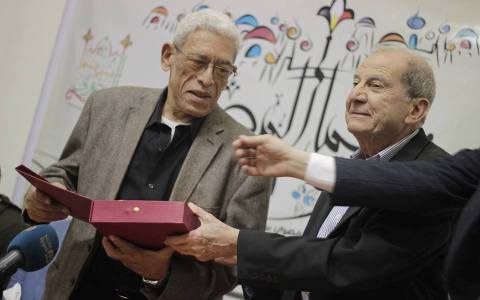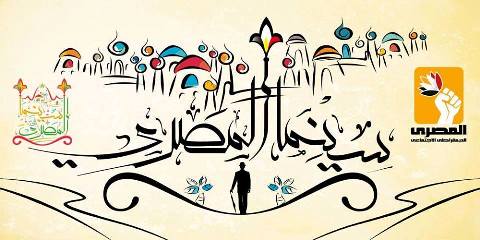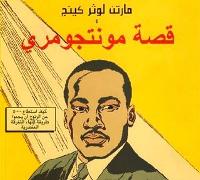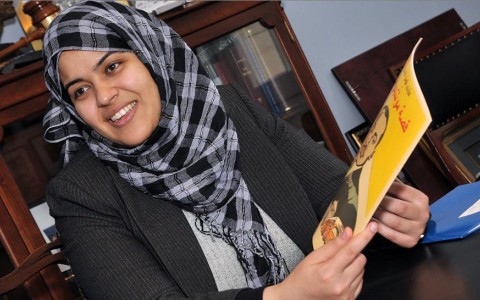Martin Luther King’s legacy lives on – among Egypt’s battered liberals
by - 9th March 2016

EGYPT’s centre-left secularist party has an unlikely mascot: America’s most famous Baptist preacher, Dr Martin Luther King.
King is the inspiration behind a revival of liberalism in a country where prison awaits street protest of almost any kind.
Selma was the surprise choice of film to launch a new cultural moment in post-revolution Egypt.
The 2014 film chronicles King’s march from a backwater hamlet to the statehouse in Alabama.
‘We chose Selma because it shows how civil rights movements can proceed peacefully,’ said Islam Amin, founder of the Egyptian Cinema Club.
‘We also have suffered crackdowns and violence in the streets. The situation of Selma is like Egypt today.’

Leading politicians attended the screening. One – Mohammed Abul Ghar – believes that as in King’s America only the President can make a difference to Egypt’s oppressive politics, as thinkers, writers, and ‘blasphemers’ find themselves facing lengthy prison sentences.
‘We are clearly against these laws, but the situation is very dangerous,’ said Ghar, president of the Egyptian Social Democratic Party (ESDP).
‘It must be the president who will take the step to change them; it is the only way.’
Martin Luther King suffered abuse from citizens and police alike, but his efforts mobilized a nation and culminated in the passing of the Voting Rights Act of 1965.
The ESDP, which won only four seats in the 596-member parliament, is frustrated with the path politics is taking.
Following the ouster of Muslim Brotherhood-affiliated President Mohamed Morsi, ESDP members occupied top posts in government, including prime minister.
But now, says Ghar, there is no government, only ministry heads he calls ‘secretaries to the president’.
So instead politicians are turning to culture.
‘It is hard to play politics these days, but we can still play culture,’ Amin, the ECC founder, said. ‘Culture, philosophy, and art spread tolerance and justice, where fascists and Islamists spread only lies and hate.’

But coming off the back of Egypt’s experience of political Islam, what chance is there for a Baptist preacher’s example?
Bassem Kamel, head of the political training department in the ESDP, drew three lessons from Selma and the life of King: change requires a long and sustained effort; violence is counter-productive, and to win you must win the people.
Selma also highlights King’s deftness with the media – something the new wave of liberals emulates. They invite popular culture-makers to maximize the attention they get, launching the film club cannily on the UN-designated World Day of Social Justice.
‘Culture and politics have a clear influence on each other,’ said Daoud Abdel Sayed, whose 40-year career in Egyptian cinema was honoured at the screening.
His school of ‘new realism’ emphasizes the modern struggles of ordinary Egyptians. ‘But the problem is the state has transformed culture into something only for élites,’ he says.
Translation
The ESDP’s film club is not the only Egyptian effort to use the memory of Dr King. In 2009, activist Dalia Ziada translated the obscure, 1958 comic book Martin Luther King and the Montgomery Story into Arabic.
 Two years later in 2011 she found herself distributing thousands of copies in Tahrir Square.
Two years later in 2011 she found herself distributing thousands of copies in Tahrir Square.
‘The book was being smuggled like drugs,’ she told Lapido. ‘The real challenge we are facing now is how to keep the momentum going.
‘But there is no Selma in Muslim Egypt.’
The problem has been a 40-year process of importing a foreign Wahhabi ideology, says Ziada. A moderate, Sufi-style Islam had declined as culture and state turned conservative.
Earlier sheikhs had looked to Europe for inspiration, she said, now they looked to Arabia.

‘God knows how many years we will have to wait until a 2011 revolutionary comes to power,’ said Ziada, now director of the Liberal Democracy Institute of Egypt.
‘But even if it takes forty years, I am sure this day will come,’ she adds, recalling the four-decade interlude between Selma and the election of US President Barack Obama.
Comic
Beyond the comic book there are only eight books in Arabic on the life of Martin Luther King, according to University of Michigan professor Juan Cole. But in 2012 he added another: a translation of King’s biography, published by the London-Beirut-based company Dar al-Saqi.
Others agree with Ziada that there is no comparable figure to King in contemporary Egypt. American University in Cairo professor of Arab and Islamic Civilization Mohamed Serag cites nineteenth-century Al Azhar scholar Muhammad Abduh as a possible model.
One of the founding fathers of Islamic Modernism, Abduh’s students pioneered reforms in politics, economy, and gender equality.
But today, Serag said, poor education and state policy combine to keep another Abduh, let alone a King, from emerging. ‘Despotism is the reason,’ he said. ‘Since 1952 our régimes have controlled society and do not let it prosper.’
ESDP president Abul Ghar cannot envision a change until the collapse of Saudi Arabia and its petrodollar sponsorship of religious conservatism.
‘Egypt is completely polarized,’ he added, ‘and with Islam as a religion it is very difficult. Either you become a radical salafi or you separate Islam from politics completely.’
But pushing pessimism aside, the secular party highlights a Christian minister and continues the grassroots work.
‘Yes, Martin Luther King was a pastor, and we do not have this type of figure in Egypt,’ said Kamel, the political trainer.
‘But I will not wait until we do.’
